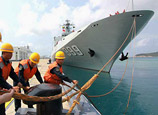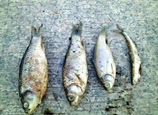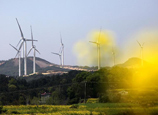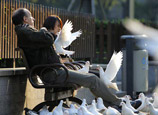
Hundreds of dead fish have washed up along the shorelines of a man-made river in Shanghai's Songjiang district since April 3, but the local water authority and environmental protection bureau insist the water is safe.
A total of 250 kilograms of dead fish, mainly crucian carp, have been retrieved in suburban Shanghai's Sijing pond since last week. Gao Yunchu, director of Songjiang water authority, said small fish with relatively weaker body defense systems were found dead at the beginning of April and the bodies of bigger fish such as carp were discovered on Saturday.
About 150 kg of crucian carp and 100 kg of bigger carp will be sent to a landfill site.
"The water quality is stable and safe," said the official, surnamed Zhang, from Songjiang Water Authority, on Sunday.
Zhang said the fish died due to illegal fishing by electrocution and poisoning, according to information from local fishermen.
Previous media reports said people living near the river claimed it wasn't the first time they had seen a lot of dead fish in the water.
When asked whether poisoned fish would affect the water quality, Zhang said "no" and that "most fish were killed by electrocution".
"The river's quality hasn't been affected by the dead fish so far. It remains the same level as usual," said Zhang, adding the authorities would continue to closely monitor water quality once a month in case there are any emergencies.
Songjiang water authority also ruled out the possibility of pollution after Friday and Saturday's water quality tests because the river is surrounded by old-fashioned residences and shops and no chemical plants. It said test results showed the levels of dissolved oxygen, ammonia nitrogen and the acid/alkali reading in the water was within the normal range.
Some of the fish have been sent to Shanghai Municipal Agricultural Commission, where the cause of death is still under investigation.
Liu Fengqiang, vice-director and spokesman of Shanghai's Songjiang district's environmental department, said the dead fish had nothing to do with the rotting pig carcasses found floating in the Huangpu River last month.
Thousands of dead pigs were discovered in the upper Songjiang section of the Huangpu River, about 100 kilometers from Jiaxing, in Zhejiang province, from the beginning of March.
"Local residents don't need to worry about water safety because the dead fish were found in a landscape river rather than a natural water source," said Liu, adding the situation also had no connection with the deadly H7N9 bird flu strain that has claimed the lives of six people nationwide.
Just one month ago, Liu told China Daily the water quality in the Songjiang area met national sanitary standards for drinking water despite the presence of so many pig carcasses.
However, residents remain concerned about water safety, especially after a large number of the dead pigs were found drifting downstream in Huangpu River.
Shi Hua, a Songjiang resident, said he stopped drinking tap water and bought bottles from supermarkets instead. "I need to trust my sources of water. I'm still haunted by the dead pigs," he said.
Shanghai authorities say they have developed more sources of quality drinking water. Some is from the Yangtze River, Qingcaosha Reservoir, Chenhang Reservoir and more will come from the under-construction Dongfengxisha Water Source Area.
"Our water source (in the Songjiang area) nonetheless comes from Huangpu River. The city now only gets 30 percent of its water from there as opposed to 70 percent previously," said Shi, adding the city center's water source came from the Qingcaosha Reservoir.
















 Life aboard a fishing boat under bridge in city of Chongqing
Life aboard a fishing boat under bridge in city of Chongqing


![]()
